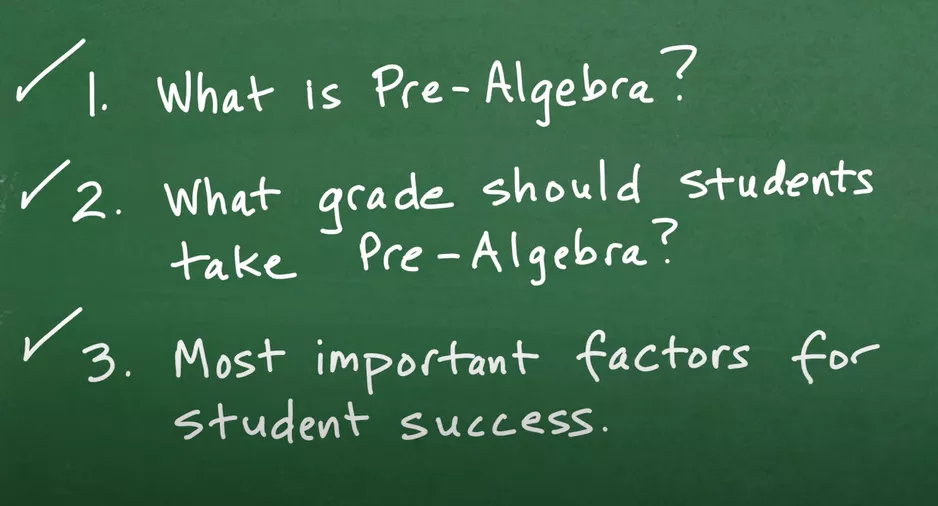What Every Homeschool Parent Needs to Know About Pre-Algebra
If you’re a homeschooling parent, you understand the importance of selecting the right curriculum for your child. In this post, I want to share some insights on homeschooling pre-algebra—why it’s critical, when to introduce it, and the factors that contribute to a student’s success in mathematics.
What is Pre-Algebra?
Pre-algebra is the foundational course that prepares students for algebra and beyond. It is typically introduced in middle school, serving as a bridge between elementary math and high school math courses like Algebra I, Geometry, and Algebra II.
Many parents think of pre-algebra as just another middle school math course, but it’s actually a crucial step in a student’s math education. Pre-algebra introduces students to the fundamental concepts of algebra, such as variables, equations, and inequalities. It builds on their existing knowledge of arithmetic and prepares them for the more complex topics they’ll encounter in Algebra I and Algebra II.
Think of the math sequence this way:
- Pre-Algebra: The first introduction to algebraic concepts.
- Algebra I: Builds upon what is learned in pre-algebra, often covering the same concepts in more depth.
- Algebra II: Revisits and expands on concepts from Algebra I.
Pre-algebra lays the groundwork for all subsequent math courses. How well your child grasps these concepts will significantly impact their performance in future math classes.
When Should Students Take Pre-Algebra?
Most students are ready for pre-algebra in the 8th grade, though some advanced students may start as early as the 6th or 7th grade. Completing pre-algebra by the 8th grade allows students to take Algebra I in 9th grade, which is the standard sequence for most college-bound students.
Here’s a typical math track for college preparation:
- 8th Grade: Pre-Algebra
- 9th Grade: Algebra I
- 10th Grade: Geometry
- 11th Grade: Algebra II
- 12th Grade: Pre-Calculus or Statistics
If your child is on a college-prep track, it’s important to get them on the right math sequence early on. If you’re unsure, consider starting pre-algebra in 7th grade and allowing two years to complete it if needed. The goal is to ensure they are thoroughly prepared for Algebra I by 9th grade.
Key Factors for Success in Mathematics
There are several critical factors that contribute to a student’s success in math:
- The Teacher: The teacher plays a vital role in a child’s learning experience. They bring the textbook to life, explaining complex concepts in a way that students can understand. A good teacher knows how to engage students, motivate them, and highlight the key concepts that are often overlooked in textbooks. Look for a math teacher who is well-qualified, experienced, and passionate about teaching.
- Quality of Instruction: Effective instruction is comprehensive and thorough. Look for courses that provide full lessons on each topic rather than quick tutorials. The more detailed the instruction, the better your child will grasp complex mathematical concepts.
- Ample Practice: Success in math requires a lot of practice. Ensure that the curriculum you choose includes a variety of practice problems with step-by-step video solutions. Your child should be exposed to numerous examples to understand different problem types and how to solve them.
- Curriculum Fit: Remember, what works for one child may not work for another. It’s essential to choose a curriculum that suits your child’s learning style and pace. Don’t be swayed solely by what others are using; instead, evaluate different programs carefully.
- Try Before You Buy: Always try a curriculum before committing. Many programs offer free previews, placement tests, or sample lessons. Use these resources to determine if a program is a good fit for your child.
Final Thoughts
Pre-algebra is a critical course that bridges the gap between middle school and high school math. It is the foundation upon which Algebra I and Algebra II are built. As a homeschooling parent, selecting the right pre-algebra course is crucial to your child’s success in math.
Consider these factors: the quality and experience of the teacher, the depth of instruction, and the amount of practice provided. Choose a curriculum that fits your child’s unique needs and remember to explore your options carefully before making a decision.
At TabletClass Math, we offer a comprehensive range of homeschool math courses, including pre-algebra, taught by an experienced math teacher with decades of experience. Our courses are designed to provide thorough instruction, ample practice, and a solid foundation for success in future math studies. Feel free to check out our free previews, placement tests, and additional information on our homeschool program page.
I hope you found this information helpful in navigating your homeschooling journey. Remember, every child is different, and there are many paths to success. Keep exploring until you find the one that works best for your child.
Wishing you the best in your homeschooling adventure!
— John Zimmerman, Founder of TabletClass Math
If you found this post helpful, please consider sharing it with other homeschool parents and checking out our courses. For more insights and free math resources, subscribe to our YouTube channel, where we have over 1,000 math videos to support your child’s learning.
TabletClass Math founder, John Zimmerman, is an expert middle and high school math teacher specializing in getting students ready for college level mathematics. He makes homeschooling math easy for students and stress-free for parents.
John’s teaching style attracts learners from all around the world of all ages, and why many teachers use his Test Prep courses for their math teaching certification exams.










